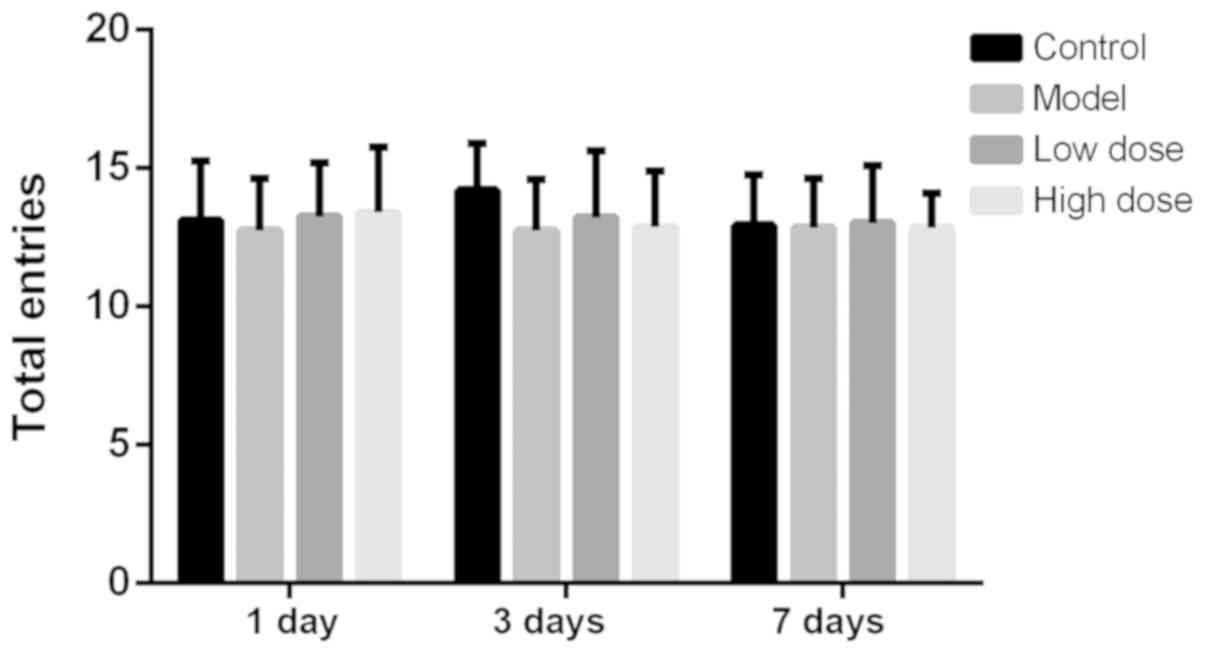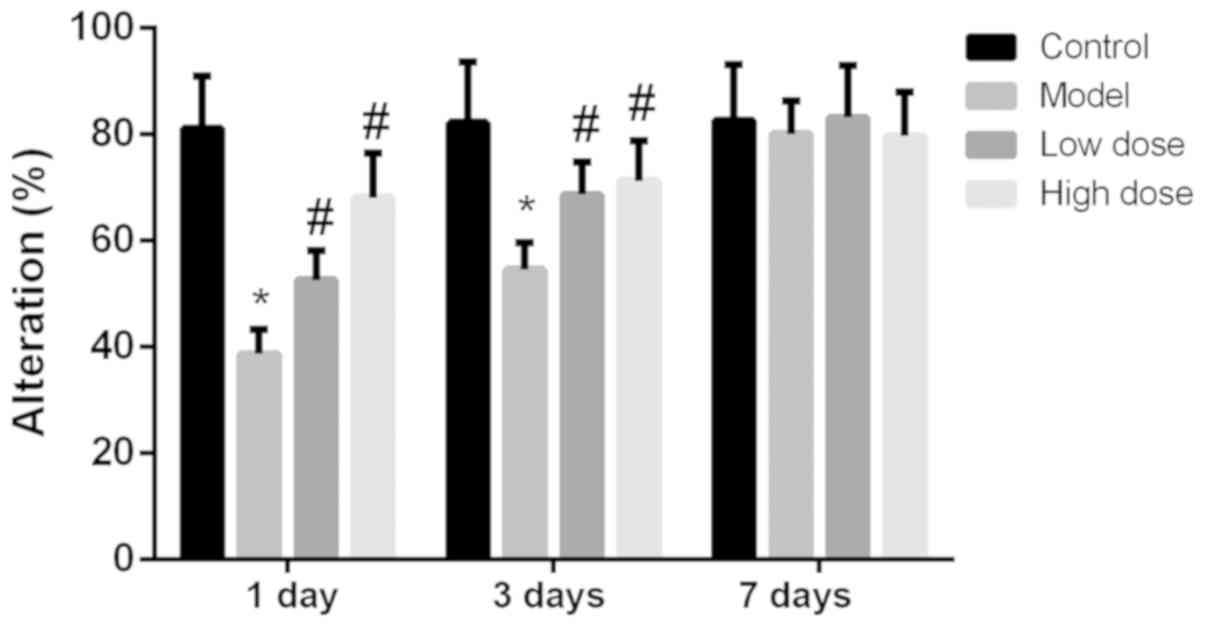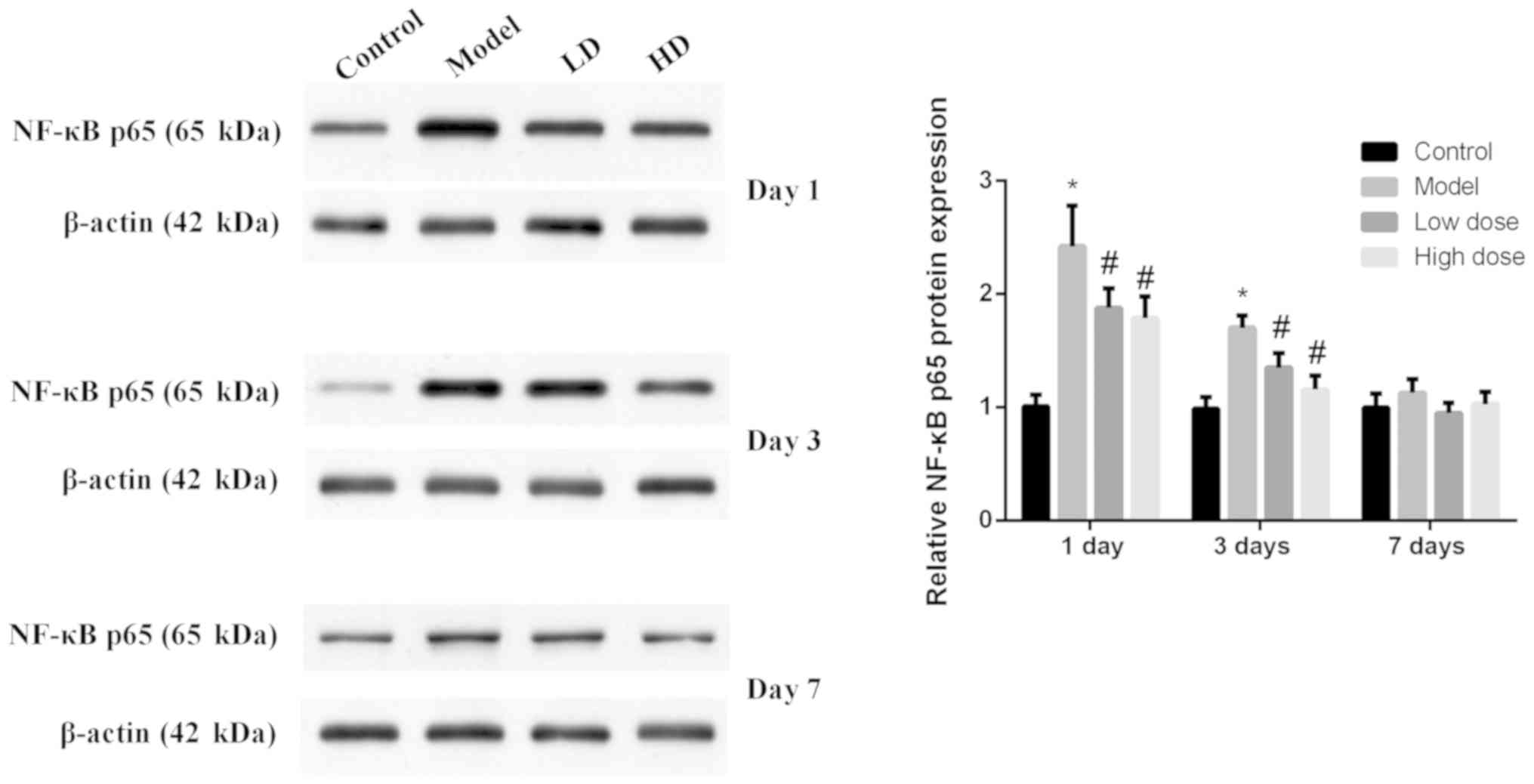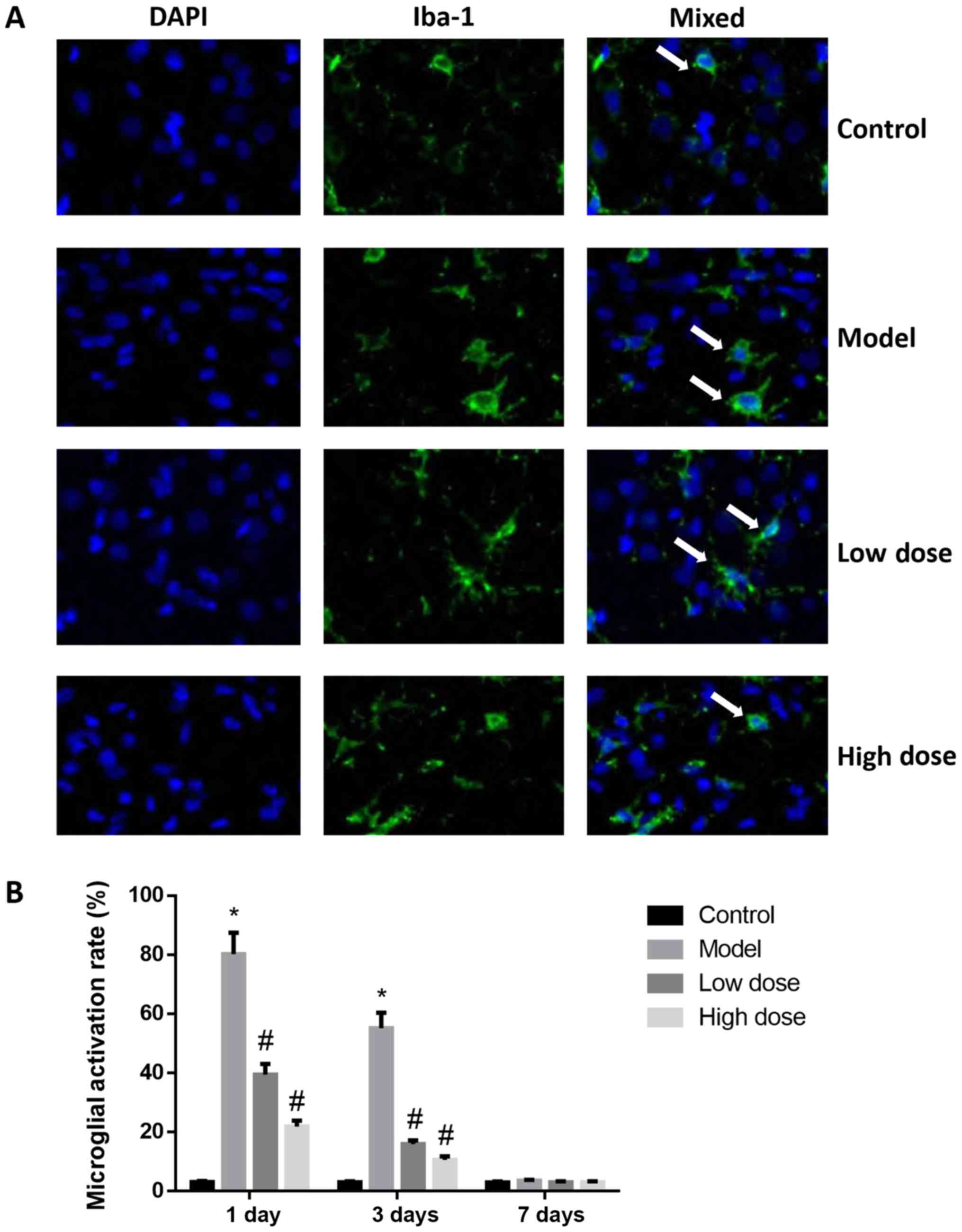|
1
|
Xu J, Dong H, Qian Q, Zhang X, Wang Y, Jin
W and Qian Y: Astrocyte-derived CCL2 participates in
surgery-induced cognitive dysfunction and neuroinflammation via
evoking microglia activation. Behav Brain Res. 332:145–153. 2017.
View Article : Google Scholar : PubMed/NCBI
|
|
2
|
Berger M, Nadler JW, Browndyke J, Terrando
N, Ponnusamy V, Cohen HJ, Whitson HE and Mathew JP: Postoperative
cognitive dysfunction: Minding the gaps in our knowledge of a
common postoperative complication in the elderly. Anesthesiol Clin.
33:517–550. 2015. View Article : Google Scholar : PubMed/NCBI
|
|
3
|
Ballard C, Jones E, Gauge N, Aarsland D,
Nilsen OB, Saxby BK, Lowery D, Corbett A, Wesnes K, Katsaiti E, et
al: Optimised anaesthesia to reduce post operative cognitive
decline (POCD) in older patients undergoing elective surgery, a
randomised controlled trial. PLoS One. 7:e374102012. View Article : Google Scholar : PubMed/NCBI
|
|
4
|
Chen J, Buchanan JB, Sparkman NL, Godbout
JP, Freund GG and Johnson RW: Neuroinflammation and disruption in
working memory in aged mice after acute stimulation of the
peripheral innate immune system. Brain Behav Immun. 22:301–311.
2008. View Article : Google Scholar : PubMed/NCBI
|
|
5
|
Cao XZ, Ma H, Wang JK, Liu F, Wu BY, Tian
AY, Wang LL and Tan WF: Postoperative cognitive deficits and
neuroinflammation in the hippocampus triggered by surgical trauma
are exacerbated in aged rats. Prog Neuropsychopharmacol Biol
Psychiatry. 34:1426–1432. 2010. View Article : Google Scholar : PubMed/NCBI
|
|
6
|
Wuri G, Wang DX, Zhou Y and Zhu SN:
Effects of surgical stress on long-term memory function in mice of
different ages. Acta Anaesthesiol Scand. 55:474–485. 2011.
View Article : Google Scholar : PubMed/NCBI
|
|
7
|
Devasya A and Sarpangala M:
Dexmedetomidine: A review of a newer sedative in dentistry. J Clin
Pediatr Dent. 39:401–409. 2015. View Article : Google Scholar : PubMed/NCBI
|
|
8
|
Keating GM: Dexmedetomidine: A review of
its use for sedation in the intensive care setting. Drugs.
75:1119–1130. 2015. View Article : Google Scholar : PubMed/NCBI
|
|
9
|
Celik F, Göcmez C, Kamaşak K, Tufek A,
Guzel A, Tokgoz O, Fırat U and Evliyaoğlu O: The comparison of
neuroprotective effects of intrathecal dexmedetomidine and
metilprednisolone in spinal cord injury. Int J Surg. 11:414–418.
2013. View Article : Google Scholar : PubMed/NCBI
|
|
10
|
Koca U, Olguner ÇG, Ergür BU, Altekin E,
Taşdöğen A, Duru S, Girgin P, Gündüz K, Cilaker Mıcılı S, Güzeldağ
S and Akkuş M: The effects of dexmedetomidine on secondary acute
lung and kidney injuries in the rat model of intra-abdominal
sepsis. ScientificWorldJournal. 2013:2926872013. View Article : Google Scholar : PubMed/NCBI
|
|
11
|
Yeh CH, Hsieh LP, Lin MC, Wei TS, Lin HC,
Chang CC and Hsing CH: Dexmedetomidine reduces lipopolysaccharide
induced neuroinflammation, sickness behavior, and anhedonia. PLoS
One. 13:e01910702018. View Article : Google Scholar : PubMed/NCBI
|
|
12
|
Han C, Fu R and Lei W: Beneficial effects
of dexmedetomidine on early postoperative cognitive dysfunction in
pediatric patients with tonsillectomy. Exp Ther Med. 16:420–426.
2018.PubMed/NCBI
|
|
13
|
Yang Z, Liu Y, Yuan F, Li Z, Huang S, Shen
H and Yuan B: Sinomenine inhibits microglia activation and
attenuates brain injury in intracerebral hemorrhage. Mol Immunol.
60:109–114. 2014. View Article : Google Scholar : PubMed/NCBI
|
|
14
|
Frakes AE, Ferraiuolo L, Haidet-Phillips
AM, Schmelzer L, Braun L, Miranda CJ, Ladner KJ, Bevan AK, Foust
KD, Godbout JP, et al: Microglia induce motor neuron death via the
classical NF-κB pathway in amyotrophic lateral sclerosis. Neuron.
81:1009–1023. 2014. View Article : Google Scholar : PubMed/NCBI
|
|
15
|
Park J, Min JS, Kim B, Chae UB, Yun JW,
Choi MS, Kong IK, Chang KT and Lee DS: Mitochondrial ROS govern the
LPS-induced pro-inflammatory response in microglia cells by
regulating MAPK and NF-κB pathways. Neurosci Lett. 584:191–196.
2015. View Article : Google Scholar : PubMed/NCBI
|
|
16
|
Chen SQ, Wang PJ, Ten GJ, Zhan W, Li MH
and Zang FC: Role of myo-inositol by magnetic resonance
spectroscopy in early diagnosis of Alzheimer's disease in APP/PS1
transgenic mice. Dement Geriatr Cogn Disord. 28:558–566. 2009.
View Article : Google Scholar : PubMed/NCBI
|
|
17
|
Zhu YS, Xiong YF, Luo FQ and Min J:
Dexmedetomidine protects rats from postoperative cognitive
dysfunction via regulating the GABAB R-mediated
cAMP-PKA-CREB signaling pathway. Neuropathology. 39:30–38. 2019.
View Article : Google Scholar : PubMed/NCBI
|
|
18
|
Xu Z, Wang D, Zhou Z, Chen Q, Zhang D,
Chen S, Jiang H, Jia C and Liu X: Dexmedetomidine attenuates renal
and myocardial Ischemia/Reperfusion injury in a dose-dependent
manner by inhibiting inflammatory response. Ann Clin Lab Sci.
49:31–35. 2019.PubMed/NCBI
|
|
19
|
Tucker LB, Fu AH and McCabe JT:
Performance of male and female C57BL/6J mice on motor and cognitive
tasks commonly used in pre-clinical traumatic brain injury
research. J Neurotrauma. 33:880–894. 2016. View Article : Google Scholar : PubMed/NCBI
|
|
20
|
Shoham S, Linial M and Weinstock M:
Age-induced spatial memory deficits in rats are correlated with
specific brain region alterations in microglial morphology and gene
expression. J Neuroimmune Pharmacol. 14:251–262. 2019. View Article : Google Scholar : PubMed/NCBI
|
|
21
|
Hsu WC, Yu CH, Kung WM and Huang KF:
Enhancement of matrix metalloproteinases 2 and 9 accompanied with
neurogenesis following collagen glycosaminoglycan matrix
implantation after surgical brain injury. Neural Regen Res.
13:1007–1012. 2018. View Article : Google Scholar : PubMed/NCBI
|
|
22
|
Lord JM, Midwinter MJ, Chen YF, Belli A,
Brohi K, Kovacs EJ, Koenderman L, Kubes P and Lilford RJ: The
systemic immune response to trauma: An overview of pathophysiology
and treatment. Lancet. 384:1455–1465. 2014. View Article : Google Scholar : PubMed/NCBI
|
|
23
|
Podjaski C, Alvarez JI, Bourbonniere L,
Larouche S, Terouz S, Bin JM, Lécuyer MA, Saint-Laurent O,
Larochelle C, Darlington PJ, et al: Netrin 1 regulates blood-brain
barrier function and neuroinflammation. Brain. 138:1598–1612. 2015.
View Article : Google Scholar : PubMed/NCBI
|
|
24
|
Romeo HE, Tio DL and Taylor AN: Effects of
glossopharyngeal nerve transection on central and peripheral
cytokines and serum corticosterone induced by localized
inflammation. J Neuroimmunol. 136:104–111. 2003. View Article : Google Scholar : PubMed/NCBI
|
|
25
|
Le Maitre E, Revathikumar P, Estelius J
and Lampa J: Increased recovery time and decreased LPS
administration to study the vagus nerve stimulation mechanisms in
limited inflammatory responses. J Vis Exp. Mar 29–2017.doi:
10.3791/54890. View
Article : Google Scholar : PubMed/NCBI
|
|
26
|
Hoogland IC, Houbolt C, van Westerloo DJ,
van Gool WA and van de Beek D: Systemic inflammation and microglial
activation: Systematic review of animal experiments. J
Neuroinflammation. 12:1142015. View Article : Google Scholar : PubMed/NCBI
|
|
27
|
Gyoneva S, Davalos D, Biswas D, Swanger
SA, Garnier-Amblard E, Loth F, Akassoglou K and Traynelis SF:
Systemic inflammation regulates microglial responses to tissue
damage in vivo. Glia. 62:1345–1360. 2014. View Article : Google Scholar : PubMed/NCBI
|
|
28
|
Kang YC, Zhang L, Su Y, Li Y, Ren WL and
Wei WS: MicroRNA-26b regulates the microglial inflammatory response
in Hypoxia/Ischemia and affects the development of vascular
cognitive impairment. Front Cell Neurosci. 12:1542018. View Article : Google Scholar : PubMed/NCBI
|
|
29
|
Fakhoury M: Role of immunity and
inflammation in the pathophysiology of neurodegenerative diseases.
Neurodegener Dis. 15:63–69. 2015. View Article : Google Scholar : PubMed/NCBI
|
|
30
|
Kim DW, Lee JC, Cho JH, Park JH, Ahn JH,
Chen BH, Shin BN, Tae HJ, Seo JY, Cho JH, et al: Neuroprotection of
ischemic preconditioning is mediated by Anti-inflammatory, Not
Pro-inflammatory, Cytokines in the Gerbil hippocampus induced by a
subsequent lethal transient cerebral ischemia. Neurochem Res.
40:1984–1995. 2015. View Article : Google Scholar : PubMed/NCBI
|
|
31
|
Loftis JM, Valerio J, Taylor J, Huang E,
Hudson R, Taylor-Young P, Chang M, Ho SB, Dieperink E, Miranda JL
and Hauser P: S100B and inflammatory cytokine levels in blood as
potential markers of blood-brain barrier damage and psychiatric
impairment in comorbid hepatitis C viral infection and alcohol use
disorder. Alcohol Clin Exp Res. Jun 28–2018.doi: 10.1111/acer.13796
(Epub ahead of print). View Article : Google Scholar : PubMed/NCBI
|
|
32
|
Farbood Y, Sarkaki A, Dianat M, Khodadadi
A, Haddad MK and Mashhadizadeh S: Ellagic acid prevents cognitive
and hippocampal long-term potentiation deficits and brain
inflammation in rat with traumatic brain injury. Life Sci.
124:120–127. 2015. View Article : Google Scholar : PubMed/NCBI
|
|
33
|
Amor S, Peferoen LA, Vogel DY, Breur M,
van der Valk P, Baker D and van Noort JM: Inflammation in
neurodegenerative diseases-an update. Immunology. 142:151–166.
2014. View Article : Google Scholar : PubMed/NCBI
|
|
34
|
Ma Y, Yu XY and Wang Y: Dose-related
effects of dexmedetomidine on immunomodulation and mortality to
septic shock in rats. World J Emerg Med. 9:56–63. 2018. View Article : Google Scholar : PubMed/NCBI
|
|
35
|
Suzumura A: Neuron-microglia interaction
in neuroinflammation. Curr Protein Pept Sci. 14:16–20. 2013.
View Article : Google Scholar : PubMed/NCBI
|
|
36
|
Bogie JF, Stinissen P and Hendriks JJ:
Macrophage subsets and microglia in multiple sclerosis. Acta
Neuropathol. 128:191–213. 2014. View Article : Google Scholar : PubMed/NCBI
|
|
37
|
Li C, Chen T, Zhou H, Zhang C, Feng Y,
Tang F, Hoi MP, He C, Zheng Y and Lee SM: Schisantherin A
attenuates neuroinflammation in activated microglia: Role of Nrf2
activation through ERK phosphorylation. Cell Physiol Biochem.
47:1769–1784. 2018. View Article : Google Scholar : PubMed/NCBI
|
|
38
|
Peng J, Zhang P, Zheng H, Ren YQ and Yan
H: Dexmedetomidine reduces hippocampal microglia inflammatory
response induced by surgical injury through inhibiting NLRP3. Chin
J Traumatol. 22:161–165. 2019. View Article : Google Scholar : PubMed/NCBI
|
|
39
|
Li JW, Zong Y, Cao XP and Tan L and Tan L:
Microglial priming in Alzheimer's disease. Ann Transl Med.
6:1762018. View Article : Google Scholar : PubMed/NCBI
|
|
40
|
Daskalopoulos EP, Malliou F, Rentesi G,
Marselos M, Lang MA and Konstandi M: Stress is a critical player in
CYP3A, CYP2C, and CYP2D regulation: Role of adrenergic receptor
signaling pathways. Am J Physiol Endocrinol Metab. 303:E40–E54.
2012. View Article : Google Scholar : PubMed/NCBI
|
|
41
|
Hoffman WE, Kochs E, Werner C, Thomas C
and Albrecht RF: Dexmedetomidine improves neurologic outcome from
incomplete ischemia in the rat. Reversal by the alpha 2-adrenergic
antagonist atipamezole. Anesthesiology. 75:328–332. 1991.
View Article : Google Scholar : PubMed/NCBI
|
|
42
|
Fang B, Li XQ, Bi B, Tan WF, Liu G, Zhang
Y and Ma H: Dexmedetomidine attenuates blood-spinal cord barrier
disruption induced by spinal cord ischemia reperfusion injury in
rats. Cell Physiol Biochem. 36:373–383. 2015. View Article : Google Scholar : PubMed/NCBI
|
|
43
|
Yang D and Hong JH: Dexmedetomidine
modulates Histamine-induced Ca(2+) Signaling and Pro-inflammatory
cytokine expression. Korean J Physiol Pharmacol. 19:413–420. 2015.
View Article : Google Scholar : PubMed/NCBI
|



















